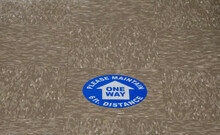
Communication from the Division
You will continue to receive weekly updates through the Superintendent about school start-up in August and early September. These weekly updates are designed to provide more details about programming, and the Parent Guidebook will be revised as necessary to further address questions arising from families. Regular updates are posted on the Division’s website, our schools’ websites, and our official social media platforms (Facebook, Twitter, and Instagram).
Communication from the School
Throughout the school year, you will receive a message from your school principal about orientations, classes, and any other important programming requirements at the school level. If there is a positive case of COVID-19 in your child’s school, your school principal will work directly with Alberta Health Services and with Division Office staff using the most current COVID-19 in school settings to communicate with “close contacts.” In a school setting, close contacts are individuals that:
- provide direct care for an individual with COVID-19 or who had similar close physical contact, OR
- had close prolonged contact (i.e., for more than 15 minutes cumulative and within 2 metres) with a case, OR
- had direct contact with infectious body fluids of an individual with COVID-19 (i.e., was coughed or sneezed on).
The school principals will also provide notification to all staff and parents/legal guardians to inform the community about what is happening and next steps as soon as permitted by Alberta Health Services.
Daily Routines
Getting to School on the Bus
Arriving at School
Signs and Arrows
Lockers, Coat Hooks, and School Supplies
Washrooms and Common Areas
Open/Closed Campus
Playgrounds
Pre-Kindergarten and Kindergarten
Pre-Kindergarten – Grade 9 Classes
Grades 10, 11, and 12 Classes
Provincial Exams
Respectful Inclusive Supported Education (RISE) Anchor Programs (Jr./Sr. High Schools) and Inclusive Education
IB and AP Exams
St. Gabriel Education Centre
Physical Education, Extracurricular Activities, and Athletics
Sports Academy
Music
Food
Field trips
Assemblies and Special Events
School Council Meetings
Libraries/Learning Commons
Supporting Mental Health and Well-being
In our Division, we provide all students with access to school counsellors. Please contact your school principal if your child experiences signs of mental duress or requires proactive support to have a successful schooling experience. In addition, parents or guardians who are concerned for their child’s well-being can reach out to these community resources:
- Mental Health Helpline: 1-877-303-2642
This toll-free helpline provides confidential and anonymous services, crisis intervention, information about mental-health services and referrals to other agencies.
- Kids Help Phone: 1-800-668-6868
- kidshelpphone.ca
- Text CONNECT to 686868
- Health Link: 811
Alberta Health Services
- Help in Tough Times
- Healthy Together - The federal First Nations and Inuit Hope for Wellness Help Line, at 1-855-242-3310 and online chat (in English and French), is available 24 hours a day, seven days a week.
GSACRD Voice is our Mental Health Capacity Building Grant Initiative comprised of a Wellbeing Team that has created resources for students and parents, including virtual evenings to talk about research-proven strategies to be resilient and healthy. Please check out these resources.
Staggered Entry and Delayed Start
We have experienced a very successful school re-entry with staggered re-entry for K-9. Face-to-Face students began classes on Aug. 31 (for students who had last names beginning (A-K) and on Sept. 1, 2020 (for students who had the last names beginning L-Z). Regular classes began on Sept. 2 for K-9 face-to-face students.
Delayed Start for K-9 Online Students:
- Sept. 8, 2020: Online education classes for K-9 students began, which was a delayed start for these students.
- Aug. 28- Sept. 4, 2020:
- Online registrations have been confirmed with school principals.
- Mr. Evan Holstein, acting school principal of GSACRD Online Pathway, can answer questions about K-9 online education.
- Online teachers will contact parents to share details about school start-up (schedules, routines, and where and how to access materials).
- Online students do not start school until Sept. 8, unless they are in high school.
- Pre-Kindergarten programs
- 31 – Sept. 4, 2020: Pre-Kindergarten Family Orientation Meetings – The teacher will contact the family to set up a time.
- 8 – 9, 2020: Staggered entry
- 10, 2020: All children attend school


